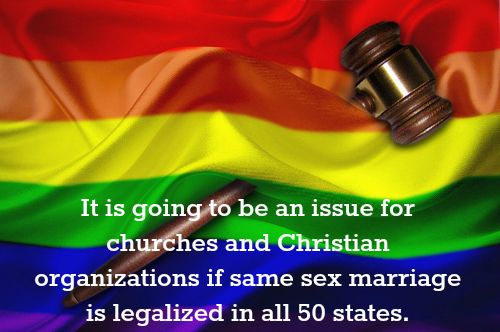Should churches and Christian organizations be concerned if the Supreme Court legalizes same sex marriage? You can answer that question with the phrase: It is going to be an issue. Those are the words of the Solicitor General Donald Verrili.
During the oral arguments on the same sex marriage case, the question of how this would affect religious institutions was raised numerous times. At one point, the lead counsel in the case tried to assure the justices that declaring a constitutional right for so-called “gay marriage” would not require clergy to perform same sex marriage ceremonies.
Later in the oral arguments, the answers were not as encouraging. Justice John Roberts asked if “a religious school that has married housing be required to afford such housing to same sex couples?” The Solicitor General didn’t really answer that question by asserting that the federal government doesn’t have a law banning discrimination in housing based upon sexual orientation. But as sure as day follows night, you can be assured that such a law would be implemented either through the legislature or the judiciary. Christian colleges and seminaries, take notice.
Justice Samuel Alito asked the Solicitor General about the right of religious groups to keep their tax-exempt status. After all, the Internal Revenue Service was allowed to strip Bob Jones University of their tax-exempt status back in the 1980s, because (at that time) they had a policy against interracial dating. Justice Alito asked if the same principle would “apply to a university or a college if it opposed same sex marriage?”
The Solicitor General paused and stumbled over his answer. First, he claimed he couldn’t answer the question without knowing more specifics. But then he admitted that: “it’s certainly going to be an issue. I don’t deny that. I don’t deny that, Justice Alito. It is going to be an issue.”
Yes, it is going to be an issue for churches and Christian organizations if same sex marriage is legalized in all 50 states. He seems to be saying that these groups can either have a biblical view of marriage or their tax-exempt status, but they can’t have both.
 Listen Online
Listen Online Watch Online
Watch Online Find a Station in Your Area
Find a Station in Your Area









 Listen Now
Listen Now Watch Online
Watch Online
